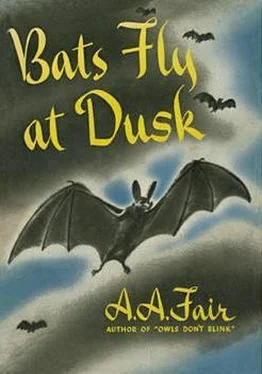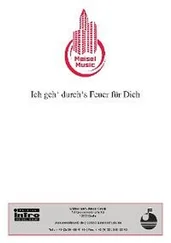“Paul!” Eva said sharply.
Mrs. Cranning cooed sweetly, “This is neither the time nor the place, Paul, for you and Eva to air any domestic differences.”
Eva Hanberry endeavored to divert attention by making a sudden frantic search of the cupboard. “After all, he might have left it in here,” she said, her words having the expressionless rapidity of the patter employed by a sleight-of-hand performer in attempting to cover up some bit of trickery. “After all, he was in this room a lot, and it’s quite possible that—”
“If you don’t mind,” Milbers said, pushing forward assertively, “I’ll do the looking.”
Bertha paid no attention to him. Her broad, capable shoulders blocked the entrance of the storage space as she started shovelling out the pile of stationery.
“Here’s a drawer back here,” she said.
“Of course, he couldn’t have got to that with all the pads of paper in the way,” Christopher Milbers observed. “Still—”
Bertha opened the drawer.
The others pushed forward. “Anything in there?” Milbers asked.
“Some pen points, stamps, and a sealed envelope,” Bertha said. “Let’s see what this is. The envelope looks promising.”
She opened the envelope, pulling out an oblong of folded paper.
“Well, what is it?” Mrs. Cranning asked as Bertha Cool’s silent interest in the paper gave evidence of its importance.
Bertha Cool said, “I have in my hand a document dated the twenty-fifth day of January 1942, and purporting to be the last will and testament of Harlow Milbers. Any of you folks know anything about this?”
“A will!” Christopher exclaimed, pushing forward.
Paul Hanberry said, “Wait a minute. What date did you say that was, January twenty-fifth? Why, I’ll bet that’s—”
“Bet it’s what, Paul?” his wife asked as he quit speaking abruptly as though wondering whether he should continue.
“The paper he had me sign as a witness,” Paul said. “Don’t you remember? I told you about that Sunday when Josephine Dell was out here. He called us both into the room and said he wanted to sign something, and wanted us to witness his signature. He signed in pen and ink, and then turned over a page and had us sign as witnesses.”
Bertha Cool turned over the first page of the document, inspected the signatures on the second page, and said, “That’s right. Two people have signed as witnesses: Josephine Dell and Paul Hanberry.”
“Then that was it. That was his will.”
“Why didn’t you tell me?” Mrs. Cranning asked sharply.
“I told Eva he had us sign something in here. I thought he said it was a will.”
“I never thought it really was a will,” Eva said hastily to her mother. “To tell you the truth, I didn’t think much of it. I remember Paul was out washing the car, and Mr. Milbers tapped on the window and asked him to come in and—”
“What’s in that will?” Christopher Milbers demanded sharply. “What does it say?”
Bertha, who had been reading the document, looked over at Milbers and said, “You aren’t going to like this.”
“Well, come on,” Paul Hanberry said, somewhat impatiently. “What’s it all about?”
Bertha Cool started reading the will:
“Know all men by these presents that I, Harlow Milbers, of the age of sixty-eight years, being of sound and disposing mind and memory, and being utterly weary, not of life (for I like that) but of the people who insist on living it at the same time I do, make this my last will and testament, in words and figures as follows:
“I have only one living relative, Christopher Milbers, a cousin, a damned hair-splitting hypocrite. I have nothing in particular against Christopher Milbers except that I don’t like him, that his personality irritates me, that he says too much about too little too often, and suppresses his own opinion upon controversial subjects because he hopes thereby to receive a measure of my bounty when I am dead.
“Much of the distaste with which I regard a final dissolution is due to a contemplation of the ghoulish glee with which my polysyllabic relative will prate about the sanctity of family, the true bond of relationship, and the inscrutable ways of Providence, all the while gleefully contemplating the material advantages which will ensue to him with the probating of my will.
“Taking all of these things into consideration and realizing the necessity of making some provision for my beloved cousin, in order to conform to the conventions and not to disappoint said beloved cousin too greatly, because, after all, he has taken time to write me long, uninteresting letters, I therefore give, devise, and bequeath to my said cousin, Christopher Milbers, the sum of ten thousand dollars ($ 10,000.00).”
Bertha turned the page. Before starting to read the second page, she surveyed the startled faces of the people about her.
“You asked for this,” she said to Christopher Milbers.
Milbers, white-lipped with indignation, said, “It is an outage — the last word of a man who has placed himself beyond each of a reply. It was unkind. It was cowardly, but, of course—”
Bertha Cool finished his sentence for him as he became thoughtfully silent. “But of course, ten thousand bucks is ten thousand bucks,” she said.
Christopher Milbers flushed. “A mere bagatelle for a man of his means,” he said. “It is definitely insulting.”
Bertha Cool started reading once more from the will.
“To my secretary, Josephine Dell, ten thousand dollars ($10,000.00).
“To Nettie Cranning, my housekeeper, Eva Hanberry, her daughter, Paul Hanberry, her son-in-law, all the rest of everything I own.
“I don’t want Christopher Milbers to have anything to do with the business in court. Nettie Cranning is to be executor of my whole estate.
“In witness whereof, and in a slightly whimsical mood, as though this preparation for the post-mortem distribution of my property had already freed me somewhat from the burden of earthly hypocrisies, I have hereunto set my hand and seal this twenty-fifth day of January, nineteen hundred and forty-two, subscribing the document in the presence of two persons whom I have called in to witness my signature and make it legal, declaring to them that it is my will, yet making certain they are unfamiliar with the contents thereof.
(signed) Harlow Milbers.
“And,” Bertha Cool went on, “there’s an attestation clause for the witness following just below. I guess I may as well read it.
“The foregoing instrument consisting of one page beside this was executed in our presence and in the presence of each of us on the twenty-fifth day of January, nineteen hundred and forty-two by Harlow Milbers, who then and there declared it to be his last will and testament, and requested us to sign as witnesses, which we did in his presence and in the presence of each other, all on this twenty-fifth day of January, nineteen hundred and forty-two. (signed) Josephine Dell, (signed) Paul Hanberry.”
Paul Hanberry was the first to break the silence. “Jumpin’ geewhillikins,” he said. “The old man left his property to us ! Why, when he asked me to sign that as a witness, I had no more idea what was in that will — I supposed, of course, it left everything to his cousin.”
“You remember the occasion of signing the will as witness?” Bertha asked him.
He looked at her as though she might have been completely crazy. “Why, of course,” he said. “I remember that. I’d forgotten about the will part of it. It was here in the library on a Sunday afternoon. He’d had Josephine Dell out to the house here, taking some dictation, and I was washing the car out in the driveway under the window. She came to the window and beckoned for me to come in. When I got in, the boss was sitting there at the table, holding a pen. He said, ‘Paul, I’m going to sign my will. I want you and Josephine to sign as witnesses, and I want you to remember, in case anyone asks you, that I didn’t seem any more crazy than usual’ — or something like that. Anyway, that was the general effect of it.”
Читать дальше









